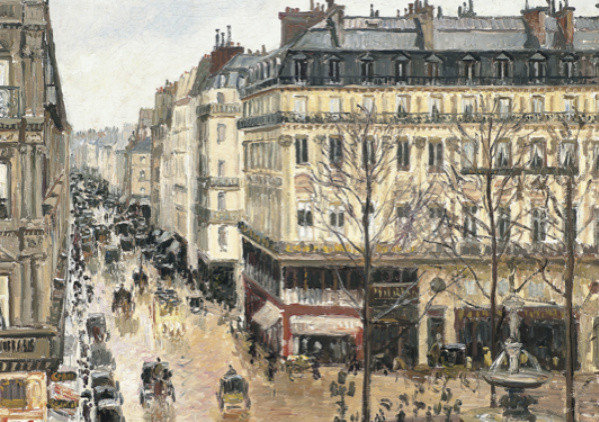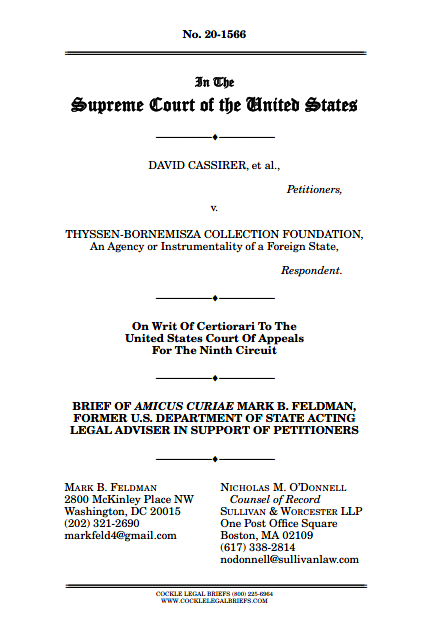The U.S. Court of Appeals for the D.C. Circuit recently dismissed a long-running dispute against Russia concerning the library of the Lubavitcher Rebbe (the Library), a collection of books and papers once held by the then-Rebbe of the Chabad Lubavitch movement. Agudas Chasidei Chabad of United States v. Russian Fed’n, 110 F.4th 242 (D.C. Cir. 2024) (Chabad 2024). Brought under what is known as the expropriation exception, 28 U.S.C. § 1605(a)(3), of the Foreign Sovereign Immunities Act (the FSIA), the case has involved Russia’s withdrawal from the case and default, sanctions of $50,000 per day for non-compliance and a judgment of more than $175 million, a retaliatory embargo on cultural property exchange that continues to this day, and multiple appeals.
In the most recent decision, the court of appeals held that the second element of the expropriation exception (what is known as the commercial nexus requirement) was not met and therefore deprived the court of any jurisdiction. Specifically, the D.C. Circuit held that if the defendant is the foreign state, the expropriation exception may only be invoked if the property is physically present in the United States (which the Rebbe’s library is not). The Supreme Court has declined to review two relatively recent cases that reached the same conclusion, it will bear watching of the plaintiffs seek further review now given a circuit split with the 9th Circuit on the issue.
Read More
Topics:
de Csepel,
Immunity from Seizure,
Foreign Sovereign Immunities Act,
Supreme Court,
Agudas Chasidei Chabad,
Russian Federation,
FSIA,
expropriation exception”,
sovereign immunity,
Russian State Library,
Chabad,
Federal Republic of Germany,
Welfenschatz,
D.C. Circuit,
Federal Republic of Germany v. Philipp,
Simon v. Republic of Hungary,
Lubavitcher Rebbe,
Schubarth,
Judge Randolph,
Brett Kavanaugh,
Judge Griffith
Today I am pleased to announce that I have filed a brief in the Supreme Court of the United States as counsel of record for amicus curiae Mark B. Feldman, former U.S. Department of State Acting Legal Adviser. We filed the brief in the case of Cassirer et al. v. Thyssen-Bornemisza Collection Foundation (“TBC”). Cassirer is the long-running dispute over title to Rue St. Honoré, après-midi, effet de pluie (Rue St. Honoré, Afternoon, Rain Effect) by Impressionist painter Camille Pissarro. The painting once belonged to Lilly Cassirer, a Jewish woman in Berlin in 1939, from whom Nazi agents “bought” the painting. The case before the Supreme Court is not about whether the painting was stolen—it is undisputed that it was. Rather, the Supreme Court will review the Ninth Circuit’s decision that Spanish law, not California law, should govern the ownership rights.
Read More
Topics:
Lilly Cassirer,
Foreign Sovereign Immunities Act,
Supreme Court,
SPK,
Stiftung Preussischer Kulturbesitz,
Hermann Goering,
FSIA,
expropriation exception”,
sovereign immunity,
UNESCO,
Rue St. Honoré,
Camille Pissarro,
Baron Hans-Heinrich Thyssen- Bornemisza,
Cassirer v. Thyssen-Bornemisza Collection,
Welfenschatz,
Jakob Scheidwimmer,
Philipp v. F.R.G.,
Mark B. Feldman

The decision on Friday to allow our clients’ claims to proceed against German and the Stiftung Preussischer Kulturbesitz for the restitution of the Guelph Treasure (or Welfenschatz) is ground-breaking in important respects, and a welcome part of a consistent progression in the law of sovereign immunity over claims for Nazi-looted art. As we noted in our initial reaction, it is the first decision in which a U.S. court has held that it has jurisdiction over Germany or an agency or instrumentality of it under the Foreign Sovereign Immunities Act (FSIA) for a claim to Nazi-looted or purchased art—though others have certainly tried—in this case finding the so-called expropriation exception applies. Critically, it recognizes that claims about forced sales in the early days of Nazi persecution indeed create jurisdiction. Moreover, the court agreed with our clients that Germany’s various excuses to avoid litigating the substance of a forced sale involving Hermann Goering based on pleas for deference or respect to the flawed Advisory Commission are no reason to dismiss the case.
Read More
Topics:
Germany,
Nazi-looted art,
Foreign Sovereign Immunities Act,
SPK,
Advisory Commission,
Stiftung Preussischer Kulturbesitz,
Hermann Goering,
FSIA,
Preemption,
expropriation exception”,
NS Raubkunst,
sovereign immunity,
Welfenschatz,
HEAR Act
I’ve been talking quite a bit to friends, colleagues and clients about the impact of last week’s decision in the Cassirer v. Thyssen Bornemisza case. The New York Times had a follow up article yesterday which was an interesting treatment of the various themes at work in the case and in restitution cases in the United States generally these days. In fact, I think the effect is mostly limited, except to the extent that the decision assumes and treats as uncontroversial important principles about sales under duress and is a case that resolved title under the Foreign Sovereign Immunities Act (FSIA). As we predicted, the Times article makes clear that the museum has absolutely no intention of giving the painting back, but did float the idea of some recognition of the historical circumstances, which is progress (certainly compared to other instances in which obvious circumstances of duress are denied).
Read More
Topics:
Lilly Cassirer Neubauer,
Terezin Declaration,
Thyssen-Bornemisza Collection,
Rue St. Honoré après-midi êffet de pluie,
Jacques Goudstikker,
California Code of Civil Procedure § 354.3,
Nazi-looted art,
Foreign Sovereign Immunities Act,
Washington Conference Principles,
Bakalar v. Vavra,
Fritz Grünbaum,
FSIA,
adverse possession,
expropriation exception”,
Restitution,
Marei Von Saher,
sovereign immunity,
Egon Schiele,
Jakob Schweidwimmer,
World War II,
Foreign Sovereign Immunities,
Restatement (Second) of Conflict of Laws § 222,
Altmann v. Republic of Austria,
Camille Pissarro,
foreign affairs doctrine,
Ninth Circuit Court of Appeals,
Museums,
Baron Hans-Heinrich Thyssen- Bornemisza,
28 U.S.C. § 1605

One of the longest running art restitution litigations in the United States has been dismissed for a second time, with another appeal likely to follow. The heirs of Lilly Cassirer Neubauer have been pursuing the return of Camille Pissarro’s Rue St. Honoré, après-midi, êffet de pluie from the Thyssen-Bornemisza Collection in Madrid for more than ten years, but on June 4, 2015 the U.S. District Court in Los Angeles ruled that the Spanish museum has acquired full title to the painting by adverse possession. The key aspect of the decision is the court’s resolution of the choice of law question, namely, should California law or Spanish law apply to the question of who owns the painting? After a lengthy analysis the court determined that Spanish law applies, and that the museum has possessed the painting long enough to have become the owner regardless of the fact that it was sold under duress. So now a case that has already been to the Ninth Circuit Court of Appeals twice will almost certainly head back a third time. The court concluded its decision by appealing to the parties to “pause, reflect, and consider whether it would be appropriate to work towards a mutually-agreeable resolution of this action, in light of Spain’s acceptance of the Washington Conference Principles and the Terezin Declaration, and, specifically, its commitment to achieve “just and fair solutions” for victims of Nazi persecution.” But it is hard to see why that would happen. Notwithstanding the dictates of the Washington Principles, the Collection has been quite content to resist the claim. Now that it has won, it is hard to imagine it suddenly taking a different view.
Read More
Topics:
Lilly Cassirer Neubauer,
Terezin Declaration,
Thyssen-Bornemisza Collection,
Rue St. Honoré après-midi êffet de pluie,
Jacques Goudstikker,
California Code of Civil Procedure § 354.3,
Nazi-looted art,
Foreign Sovereign Immunities Act,
Washington Conference Principles,
FSIA,
adverse possession,
expropriation exception”,
Restitution,
Marei Von Saher,
sovereign immunity,
Jakob Schweidwimmer,
World War II,
Foreign Sovereign Immunities,
Restatement (Second) of Conflict of Laws § 222,
Altmann v. Republic of Austria,
Camille Pissarro,
foreign affairs doctrine,
Ninth Circuit Court of Appeals,
Museums,
Baron Hans-Heinrich Thyssen- Bornemisza,
28 U.S.C. § 1605,
Welfenschatz






